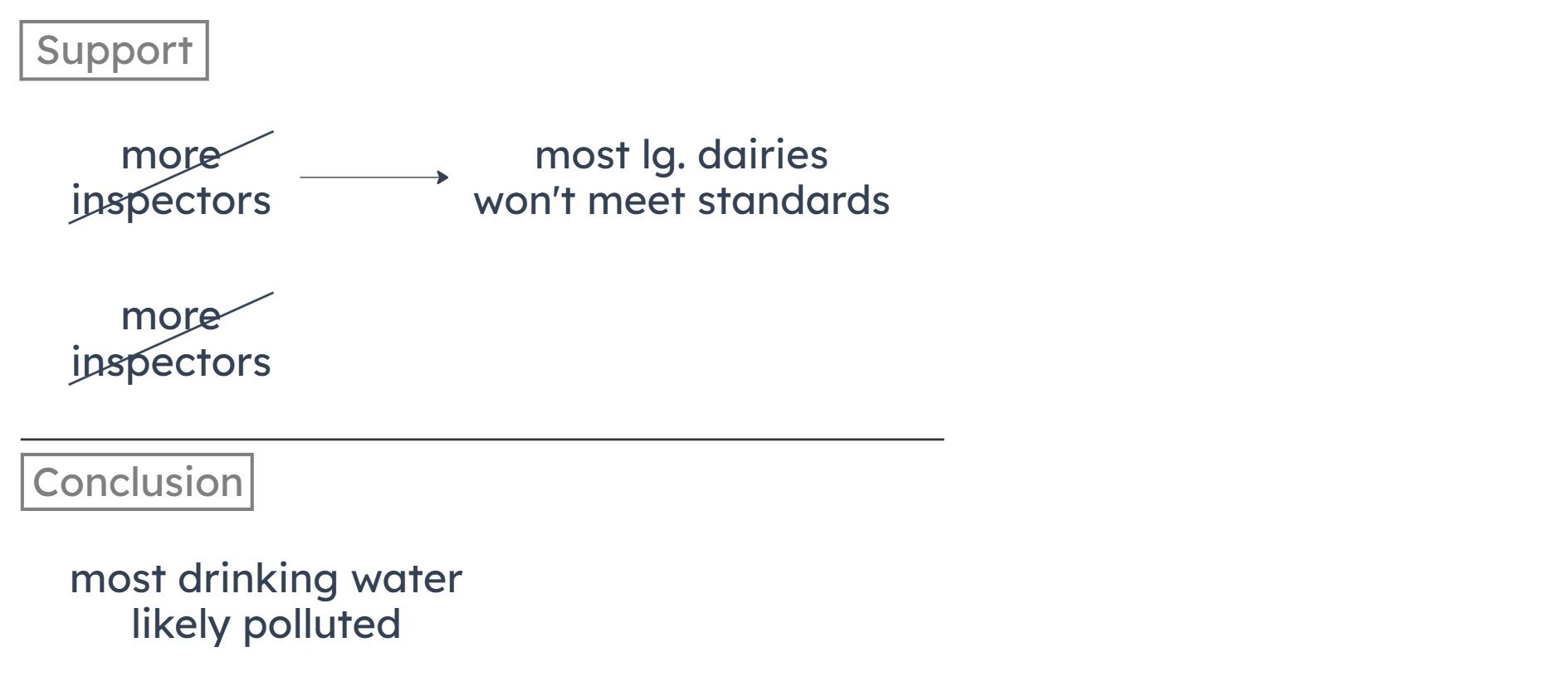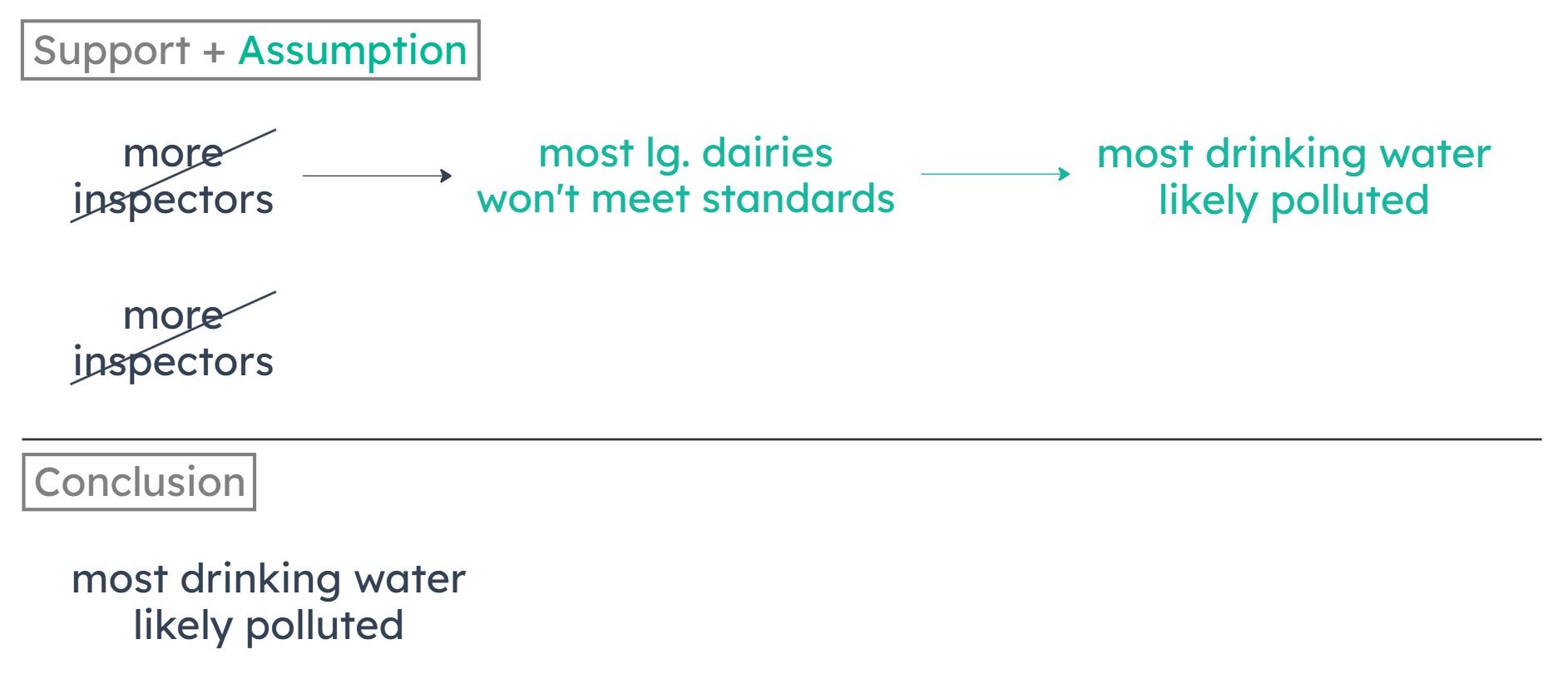Sign up to star your favorites LSAT 140 - Section 2 - Question 26
November 17, 2013
A
using a claim about what most people appreciate to support an aesthetic principle
B
appealing to an aesthetic principle to defend the tastes that people have
C
explaining a historical fact in terms of the artistic preferences of people
D
appealing to a historical fact to support a claim about people’s artistic preferences
E
considering historical context to defend the artistic preferences of people
Sign up to star your favorites LSAT 140 - Section 2 - Question 23
November 17, 2013Sign up to star your favorites LSAT 140 - Section 2 - Question 24
November 17, 2013
A
It is a claim for which no support is provided in the argument, and that is used to illustrate the conclusion of the argument as a whole.
B
It is a claim for which no support is provided in the argument, and that is used to support a claim that in turn lends support to the conclusion of the argument as a whole.
C
It is a claim for which some support is provided in the argument, and that itself is used to support another claim that in turn lends support to the conclusion of the argument as a whole.
D
It is a claim for which some support is provided in the argument, and that itself is not used to support any other claim in the argument.
E
It is a claim for which some support is provided in the argument, and that itself is used to support two distinct conclusions, neither of which is intended to provide support for the other.
Sign up to star your favorites LSAT 140 - Section 2 - Question 17
November 17, 2013Sign up to star your favorites LSAT 140 - Section 2 - Question 18
November 17, 2013
A
Implementing flexible schedules would be an effective means of increasing the job satisfaction and efficiency of managers who do not already have scheduling autonomy.
B
Flexible-schedule policies should be expected to improve the morale of some individual employees but not the overall morale of a company’s workforce.
C
Flexible schedules should be expected to substantially improve a company’s productivity and employee satisfaction in the long run.
D
There is little correlation between managers’ job satisfaction and their ability to set their own work schedules.
E
The typical benefits of flexible-schedule policies cannot be reliably inferred from observations of the effects of such policies on managers.
Sign up to star your favorites LSAT 140 - Section 2 - Question 19
November 17, 2013
A
Most people who voted in the election that Lopez won did not watch the debate.
B
Most people in the live audience watching the debate who were surveyed immediately afterward said that they thought that Tanner was more persuasive in the debate than was Lopez.
C
The people who watched the televised debate were more likely to vote for Tanner than were the people who did not watch the debate.
D
Most of the viewers surveyed immediately prior to the debate said that they would probably vote for Tanner.
E
Lopez won the election over Tanner by a very narrow margin.
Sign up to star your favorites LSAT 140 - Section 2 - Question 20
November 17, 2013Sign up to star your favorites LSAT 140 - Section 2 - Question 21
November 17, 2013Editor: Most of the books of fiction we have published were submitted by literary agents for writers they represented; the rest were received directly from fiction writers from whom we requested submissions. No nonfiction manuscript has been given serious attention, let alone been published, unless it was from a renowned figure or we had requested the manuscript after careful review of the writer’s book proposal.
Summary
If a fiction book was published → submitted by a literary agent OR received directly by request.
If a nonfiction book has been given serious attention (or published) → from a renowned figure OR requested after review of book proposal.
Very Strongly Supported Conclusions
There’s no obvious conclusion to draw from the stimulus. Just keep in mind that we have one rule for what must be true if a fiction book was published, and we have another rule for what must be true if a nonfiction book was given serious attention or published.
A
Most unrequested manuscripts that the publishing house receives are not given serious attention.
Not supported, because most unrequested manuscripts might be from a renowned figure. Or, they might also be fiction manuscripts submitted by literary agents. This is why most unrequested manuscripts still might be given serious attention.
B
Most of the books that the publishing house publishes that are not by renowned authors are books of fiction.
We don’t know the proportion of books that are fiction among non-renowned authors. It’s possible that every book by a non-renowned author is a nonfiction one (that was published after review of the book proposal).
C
If a manuscript has received careful attention at the publishing house, then it is either a work of fiction or the work of a renowned figure.
Not supported, because a manuscript that gets careful attention could be a nonfiction one that was requested after careful review of the book proposal.
D
The publishing house is less likely to give careful consideration to a manuscript that was submitted directly by a writer than one that was submitted by a writer’s literary agent.
We don’t know anything about the comparative likelihood of giving careful consideration. Notice that the rule about fiction books doesn’t say anything about careful consideration.
E
Any unrequested manuscripts not submitted by literary agents that the publishing house has published were written by renowned figures.
Supported. If a manuscript is unrequested, and not submitted by a literary agent, then it can’t be a book of fiction. So, it must be a nonfiction book. And if it’s a nonfiction book that’s published, if it’s not requested, then it must be from a renowned figure.
Sign up to star your favorites LSAT 140 - Section 2 - Question 22
November 17, 2013
If most large daries in the central valley don’t meet federal standards, then most of the district’s drinking water is likely to be polluted.
A
If most of the dairies in the central valley meet federal standards for the disposal of natural wastes, it is unlikely that most of the district’s drinking water will become polluted.
B
To keep all the drinking water in the district clean requires more dairy inspectors to monitor the dairies’ disposal of natural wastes.
C
All of the district’s drinking water is likely to become polluted only if all of the large dairies in the central valley do not meet federal standards for the disposal of natural wastes.
D
Most of the district’s drinking water is likely to become polluted if most of the large dairies in the central valley do not meet federal standards for the disposal of natural wastes.

E
If none of the large dairies in the central valley meets federal standards for the disposal of natural wastes, most of the district’s drinking water is likely to become polluted.
Sign up to star your favorites LSAT 140 - Section 2 - Question 16
November 17, 2013